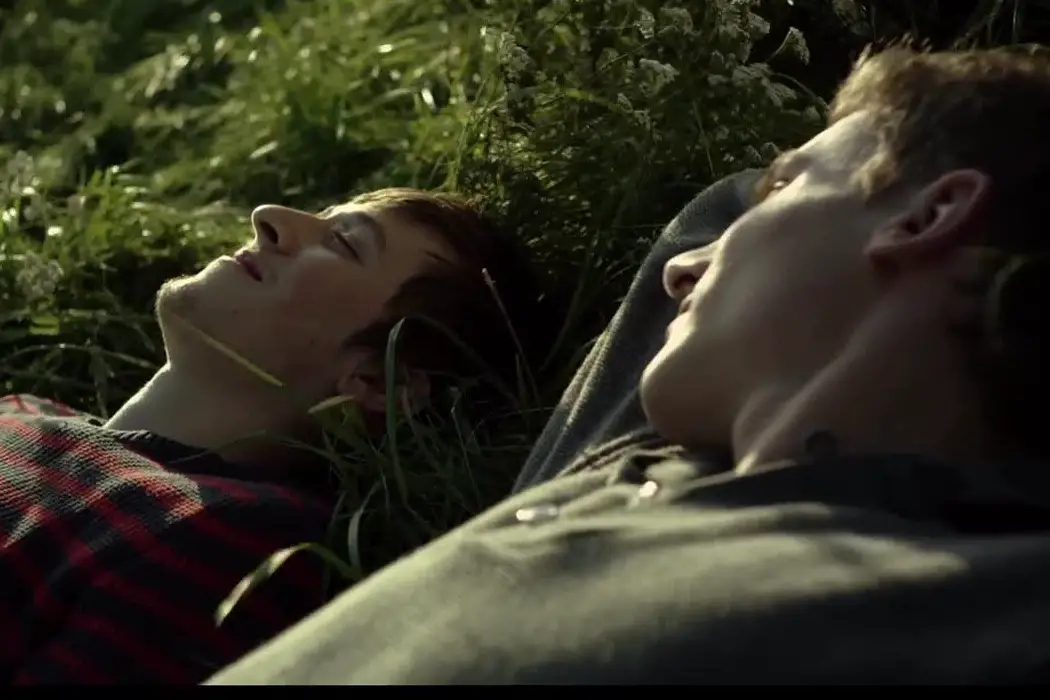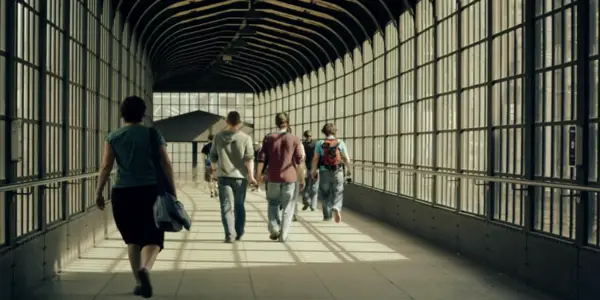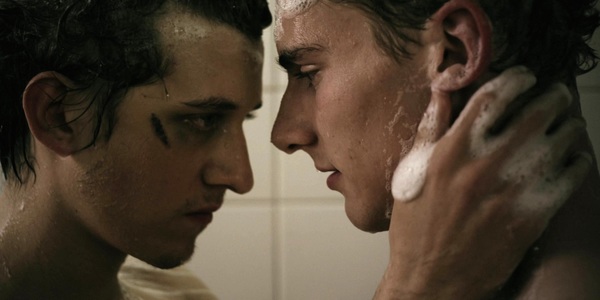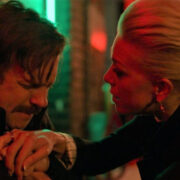Queerly Ever After #8: Interview With SILENT YOUTH (2012) Lead Martin Bruchmann

Amanda Jane Stern is an actress, writer, and director from…
Queerly Ever After is a bi-monthly column where I take a look at LGBT+ films that gave their characters a romantic happily-ever-after. There will be spoilers. If you didn’t get a chance to check out my review of Silent Youth in part 1, do so here, and then come back to this interview.
After watching 2012’s Silent Youth, I followed one of the movies two leads, Martin Bruchmann, on Instagram. I decided to shoot my shot and slid into his DMs to try to snag an interview. Somehow it worked, and we set up a Skype chat as he lives in Berlin and I live in NYC. Here is our chat, edited for length and clarity.
Amanda Jane Stern for Film Inquiry: So, I don’t know if you got a chance to rewatch [Silent Youth] or not.
Martin Bruchmann: Yes, yesterday night actually.
Ok, I watched it yesterday as well. It came out in 2012, do you remember when you filmed it?
Martin Bruchmann: 2010 I think.
It made the festival rounds.
Martin Bruchmann: Yeah, I think we had our world premiere in Valencia, Spain – that was nice. And then, we went to a few festivals. And after that there was the normal start in the cinemas.
When did you start acting?
Martin Bruchmann: I started acting, like really technically, when I started studying, that was 2009. I always did music and at some point I decided, ok, I also want to be an actor. I think I was maybe 17. And I tried to get in the movie scene and get an agent. I was seriously acting, like my first movie I shot when I was 18.
How old were you when you did Silent Youth?
Martin Bruchmann: I was 21.
How did you get involved with that project? Was it just a normal, came through your agent?
Martin Bruchmann: I’m not sure if I saw it in some kind of platform or if it came through my agent. I don’t remember, but I had an agent at the time, so maybe it came through her.
And was there a big audition process or was it kind of just like, hey, we like you?
Martin Bruchmann: No, no I had an audition. It was in Berlin. At the time I was living in Leipzig because I was studying there. So it was kind of exciting for me to go to Berlin to have an audition for a cinema movie. So I had this audition with Josef (Mattes, the other lead) also.
He’s much harder to find online.

Martin Bruchmann: Yeah. At that time he was kind of well known in the industry, and I was [like] “ok, wow, I’m auditioning with him”. I was very new. And now, he stopped acting, that’s why you don’t find him. It’s very hard to catch him now.
Anyway, so we had this audition together and the chemistry was, weirdly, very good and kind of intimate between us. So yeah, that’s what I think Diemo (Kemmesies) the director liked, and he said ok, I’m taking these two guys. So they told me that I got the role. And then, before we were shooting, we had a few rehearsal meetings, where we kind of found out about the characters and got to know each other. That’s such a luxury nowadays.
The movie is pretty intimate, so it’s good that you got to [rehearse].
Martin Bruchmann: Yeah, it helped a lot, because we got to know each other, Josef and me, and we actually became kind of good friends at the time. We were really supporting each other and taking care through the shoot. It was very nice.
It’s pretty intense, some of the script.
Martin Bruchmann: I’m trying to remember if it was intense when we were shooting it. I mean it was intense because I was there all the f*cking time, like every day from start until the end. That was very new for me and that was intense. And I remember that emotionally, it became intense after every day because my character Marlo, he kind of sucked in all the emotions and all the stuff, you know?
Especially in the ending when Kirill gets a bit confusing and he’s refusing to talk or to be clear or whatever, so the tension inside got bigger, bigger, bigger in the character, and I also really felt it. I was so looking forward to the scene in the end, where we have this little physical fight, and I was screaming at him. In my head, when I read the script it was much bigger. But, yeah I was really looking forward to it, to release.
Yeah, he’s [Kirill] a really interesting character. Kirill clearly has some problems. And from a lot of the reviews I have read people wonder if the things that he tells Marlo are actually the truth or if he’s lying. I don’t necessarily think he’s lying, but I think he was in Russia and got assaulted.
He said he was in a park and he met these men, so that kind of makes me think he was cruising, and Moscow is not great for LGBT people still. So I guess that’s probably what happened there and he’s dealing with that trauma. Did you ever talk about, why does Marlo stay?
Martin Bruchmann: I don’t remember if we talked about it, but I think he is staying because he is attracted to Kirill, not just physically, but in a mental way that he found someone. I think this is one reason, another reason he’s not just someone who’s meeting people and going ok, he’s weird, I’m not interested anymore in friendship or whatever, I think he’s more loyal.
Ok, I get that.
Martin Bruchmann: Yeah, he’s a very warm-hearted and loyal person. And he’s not scared when people have like strange things, like Kirill is obviously very strange, but he kind of has an understanding for it. I don’t know why, but this is how I saw it.
That makes a lot of sense. And he’s not out looking for a hookup, he’s looking for a relationship.

Martin Bruchmann: Not even, he’s looking for more stuff to experience to be more clear about himself, and I think at the time Kirill is like the only person, like the door where he can go in.
I think that last shot, where it’s the train station and you two are walking and you get closer and closer and then you start holding hands, it’s incredibly powerful.
Martin Bruchmann: I think so too. And when I saw it yesterday, I thought also about being queer, like how it is to be queer in a big city, because they’re not holding hands.
Yeah, it’s like they’ve locked fingers.
Martin Bruchmann: Yeah, like one finger is touching. For me it’s also a picture of hiding still. It’s a nice ending and kind of powerful but it also tells more about the society and that it’s not so easy, especially for those two guys who are really insecure with themselves at this moment in their lives. And how to figure this out in a society, this was 9 years ago. It changed a little bit now, but still how to find things out in a society where homosexuality is not the most normal thing in the world.
They’re both very reserved and now they’re showing that they’re connected in some way. Do you think there’s a chance for them?
Martin Bruchmann: We talked about it while we were shooting. I always saw, yeah, a good possibility that they can be together, because they’re both weirdos and they match, so I think they are good for each other. And Kirill obviously has some psychological problems that he needs to solve, and I think Marlo is smart enough to see it and to give it a chance.
He’s not gonna run away from someone just because…
Martin Bruchmann: Yeah, just because he has issues or something. There’s something he found in Kirill that is really holding him. There’s something strong. As Marlo, and also as the actor, I felt hope.

Was this your first feature film?
Martin Bruchmann: It was.
So, here in the states, and it’s changing now, but there is this idea that when you do a script, taking on a character who is LGBT, you know a lot of actors are afraid that that’s going to hurt their careers or actors who are actually LGBT don’t want to take these roles because then it puts them in a box. Is that the same in Germany and was there any kind of qualms for you, about taking on the character?
Martin Bruchmann: I think back then it was like that, and my agent said, ok, it’s fine to do this movie, but after that there shouldn’t be any LGBT stuff. Yeah, it’s like the same with you?
Yeah. Actually there’s an actor (Timothy Olyphant) who did a movie back in 2000 called The Broken Hearts Club and he said, his agent said ok, great you played a gay guy – you can’t do it again.
Martin Bruchmann: Yeah, this is actually what she [my agent] said.
Here, I think it’s changing, I think it’s different for women a little bit. The idea of women together titillates men so they’re like, we don’t care. Whereas for men it’s a little more rigid. Do you think that’s changing?
Martin Bruchmann: I truly hope. I feel that it’s changing a little bit, but there was just a panel on LGBT in the industry. The fact that these things are coming up is showing that it’s moving a little bit. And I think, I hope that all the discussion about women in movies and how they are perceived, this is a very good topic now to solve. And I hope and I think that after this is solved a little bit it comes also to the LGBT side, you know? Because if you change the image of, like how people see women in movies or their roles or whatever, it’s also changing with men.
Right, they do go hand-in-hand because there is the portrayal of gay men as effeminate.
Martin Bruchmann: Yes, it does go hand-in-hand, and there is a long way still. I mean, let’s say I get an offer for another LGBT character in a big movie, I would not say no, because it’s very important to support those topics. Even though my agent would say oh, it’s not so good because you already played one, blah blah, I wouldn’t give a shit, because this is how things get changed. Right now I’m watching, it’s an old show but for me it’s good cause it’s short and it’s funny, Brooklyn Ninety-Nine. You know this show?
Yeah yeah yeah, I love Brooklyn Nine-Nine.
Martin Bruchmann: It’s funny. And yesterday I was watching it and it came to my mind, I never saw it because it’s written so normal that the boss, I forgot his name.
Captain Holt.
Martin Bruchmann: Yeah, Captain Holt, that he has a husband. And it’s so nice. He has the rainbow flag on his desk. But no one is talking about it [the show] being gay or something, it’s taken so natural and normal and this is what we need to bring it up as a normal thing.
Yeah, that’s a show that handles it well. There was also another show that just ended this year, Crazy Ex-Girlfriend, that had several LGBT characters that just were and it was whatever.
Martin Bruchmann: Yeah, it’s so relieving when I see something like that.
Well, I don’t want to keep you too much longer, so thank you for taking the time to talk to me. I’m sure it was weird getting a message to talk about this movie.
Martin Bruchmann: Yeah. I liked watching it and I liked talking to you so thank you for the message.
And I’m glad you rewatched the movie too.
Martin Bruchmann: It was a nice experience. Actually, I thought ugh, I wasn’t in the mood to watch it because I saw it, I don’t know how many times. But, it’s very interesting to see myself, how I played 9 years ago. It was exciting to see it.
Film Inquiry thanks Martin Bruchmann for taking the time to speak with us!
Does content like this matter to you?
Become a Member and support film journalism. Unlock access to all of Film Inquiry`s great articles. Join a community of like-minded readers who are passionate about cinema - get access to our private members Network, give back to independent filmmakers, and more.
Amanda Jane Stern is an actress, writer, and director from New York City. She received her BA in Film, Television & Interactive Media and Theater Arts from Brandeis University. She loves regaling whomever will listen with her endless lists of fun facts and knowledge of film history. Follow her on twitter and instagram @amandajanestern










